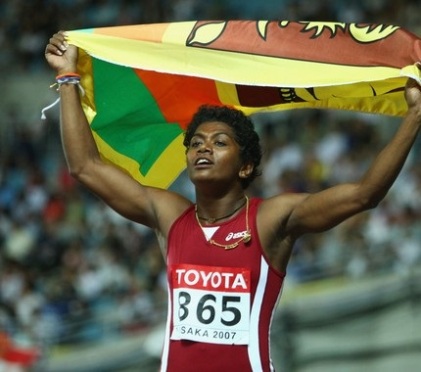No more lame excuses
Sports Minister debunks myth that athletes lack resources to shine

By The Line Judge
Sports Minister Namal Rajapaksa was the ‘Talk of the Town’ this week making a keynote address entitled ‘Creating a Professional Sports Culture’ at the Colombo School of Business and Management. The youthful minister walked the talk as he impressed on the corporate sector about laying the foundation of creating professionals and entrepreneurs in sports.
Among the salient features of his discourse was that just as there are no shortcuts to success, there is no room for excuses for failures when Sri Lanka has abundant resources, which are not being utilized.
“We were unable to build up a sports culture in the country mainly due to certain issues that arose from time to time. In 1983 there were insurgencies; people were more concerned about saving lives than engaging in sports. The same happened in 88-89. The brutal terrorism that existed in the country for 30 long years didn’t allow the public to concentrate on building a sports culture on the island. But, we also shouldn’t forget that it is during the same period we won an Olympic medal, Asian medals and a Cricket World Cup, amid so many challenges,” he noted.
He argued that athletes should not make lack of infrastructure facilities an excuse for not winning medals and questioned whether the athletes were making maximum use of the resources that we have in hand.
“We hear a lot of people making statements saying that there are no proper facilities nowadays to engage in sports. I am not comparing 2020 with the 1990s but when we won so many medals what sort of facilities did we have? Susanthika Jayasinghe won an Olympic medal, but in comparison to the current day, she didn’t have many facilities, and the same goes when we won the 1996 World Cup. We should not make infrastructure facilities an excuse for not winning medals,” said Namal, a former national rugby captain himself.
“I guess no country has more grounds than Sri Lanka but how many of us are making the maximum use of the resources provided. We are a country that is surrounded by the sea. So why can’t we practice and win medals at the two miles. Many say since we don’t have swimming pools we are not in a position to qualify for Olympics, but still we have the sea and the two-mile is one event we should focus on more. Every youth in the country rides a bicycle and for instance, if you consider the Sinhala and Tamil New Year festivities, I guess no other country has more marathons and bicycle races than in Sri Lanka. These are events that we should focus on more and try to win at international levels,” he said.
More significantly Namal also stated that it was time to produce sports entrepreneurs. Explaining the difference between a professional sportsman and woman, and an entrepreneur he stated, “Until you professionally engage in sports you are considered as an athlete. Our aim is to produce more and more sports entrepreneurs through sports clubs. When these two things (athlete and sports entrepreneur) are connected together then it will create a prominent sports economy.”
He wants sports to become a marketing tool and create international brands to achieve his dream of laying the groundwork for a billion-dollar industry during the next five years.
“We spend millions of dollars on campaigns to promote #SriLanka on the global stage, however we could never get the coverage and exposure Yupun Abeykoon got in 10.16 sec. or @Hiruni_W got running the 5000m in Nashville. It’s time we relook at #sports & what it can do!” he later tweeted.
Italian-based Abeykoon was crowned South Asia’s fastest when he won an athletic meeting in Germany while American-based Sri Lankan marathoner Wijayaratne,who won a 5,000m event, tweeted she was “Very impressed and inspired by the pragmatic vision and approach discussed by Hon. Sports Minister. As he said, no more complaints, let’s get to work.”
Indeed, Sri Lankans are notorious for giving lame excuses when they cannot win on the international stage. As the minister pointed out there is no dearth of sports field in Sri Lanka. For instance, in the heart of Colombo there is the SSC, CCC, NCC, and grounds at Royal, Thurstan and D.S. Senanayake, while gyms spring up like mushrooms. Even in the villages you find many grounds which are not made use of. “But how many medals do we have,” questioned Namal.
He is on a quest to imbibe the principles of why children should be engaged in sporting activity from a young age by introducing a sports culture and giving athletes goals to achieve, challenging them to raise the bar and improve their standards. Even accepting the fact some sports may not have international standard facilities, on the contrary he wondered why national records set by the likes of Susanthika Jayasinghe, Damayanthi Darsha and Sugath Tillakaratne have not been broken for decades.
He wants sports to become a part of life for children from the Montessori grade and create the environment for talented athletes to rise and shine. His aim is to change the system to create a healthy nation by providing them opportunities to excel not only in sports but academically as well, so they can become confident individuals who would be a boon to society.
Blaming the exam-oriented education system where students aim to become doctors, lawyers, the minister said he wants to create a pathway for sportsmen and women to become professionals and entrepreneurs in sport which is a 650 billion-dollar industry in the world.
If, as he says he is able to create a corporate structure where there is no political interference and national sports associations are financially independent, it would certainly bring about a renaissance in the sporting culture of the country.
-ENCL

